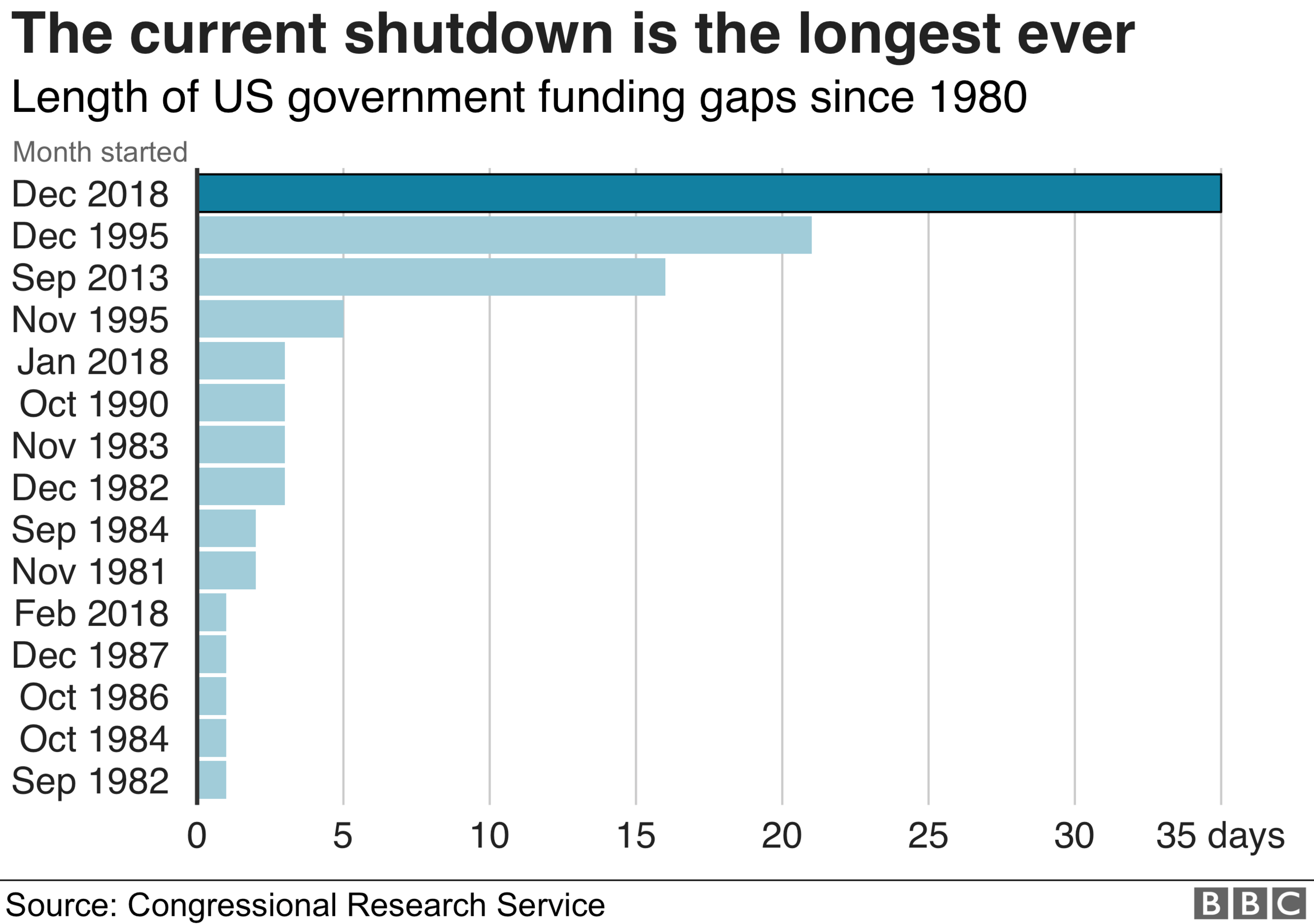US shutdown: Senate rejects bills to reopen government
- Published
President Trump: "Many of those people who are not getting paid are totally in favour of what we are doing"
The US Senate has rejected two bills to end the government shutdown, leaving no end in sight to the record-breaking closure of federal agencies.
The Republican legislation garnered 50 votes with 47 against, with 52-44 for the Democratic bill. Both measures needed 60 votes to pass.
Meanwhile, 800,000 federal workers who are struggling to cover their bills will miss another payday on Friday.
At 34 days with no end in sight, this is the longest shutdown in US history.
Six Republican defectors - including former White House candidate and Utah Senator Mitt Romney - voted for the Democratic bill. It would have reopened the government until 8 February.
One conservative Democrat backed the Republican measure, which would have provided the $5.7bn (£4.4bn) that President Donald Trump wants to build a southern border wall. It would also have temporarily shielded from deportation some US residents who entered the country without documentation as children.
Afterwards, Senate leaders from both parties briefly discussed a new proposal to reopen federal agencies for three weeks.
Mr Trump was noncommittal, telling reporters at the White House that he would only sign a bill if it included a "down payment" on a border barrier.
The Democratic leader of the US House of Representatives, Speaker Nancy Pelosi, said the Republican president's request was not reasonable.
Boy sells art to help mother through shutdown
The political imbroglio frayed tempers on the Senate floor on Thursday.
Before voting began, Michael Bennet, a Colorado Democrat, shouted at Texas Republican Ted Cruz, accusing him of shedding "crocodile tears" over unpaid workers while supporting the president's plan for "a medieval barrier".
Meanwhile, Commerce Secretary Wilbur Ross questioned why unpaid civil servants have been visiting food banks, saying they should just take out a bank loan.
Speaker Pelosi accused Mr Ross, multi-millionaire, of a "'let them eat cake' kind of attitude".
Ahead of the vote, an Associated Press opinion poll, external reported that the shutdown had negatively impacted Mr Trump's popularity.
Just 34% of Americans in the survey supported Mr Trump overall - down from 42% a month earlier. But his approval among Republican voters was close to 80%.

Something has to give

Now it's back to square one. Democrats in the House of Representatives suggest they could pass a package with border security - but no direct wall funding - as a compromise.
That's a change from the no-negotiation position they held for over a month, but the president has previously said this was not sufficient.
Something has to give.
Will Mr Trump's sagging polls ratings and these latest signs of dissent in the party's Senate ranks be enough to change his mind?
While the president boasts about never conceding defeat, he surprised many by abruptly backing away from the recent showdown over the State of the Union Address. He also reversed course last year on his family separation policy at the border following public outcry.
A break, if it comes from the president, could happen quickly. The Democratic position would have to erode over time - and, for the moment, the party remains fairly united.

Also on Thursday, former White House chief of staff John Kelly and four other former homeland security secretaries wrote to lawmakers and the president, calling for the agency to be funded again.
They said it was "unconscionable" that Department of Homeland Security (DHS) employees were working unpaid on matters of national security.
The letter said those civil servants "should not have to rely on the charitable generosity of others for assistance in feeding their families and paying their bills".
Just why has the US government partially shut down?

How is the shutdown biting?
FBI: A report from agents nationwide has warned the bureau's resources are at breaking point, which has delayed sensitive investigations and compromised operations
Flight safety: This week, air traffic, pilot and flight attendant union leaders released a statement saying they "cannot even calculate the level of risk currently at play"
Food shortages: A food bank for Coast Guard families in the north-western US state of Washington ran out of meals amid high demand
Immigration delays: More than 42,000 immigration hearings have been suspended, adding to a court backlog of over 800,000 cases
Read more: The impact of the government shutdown

